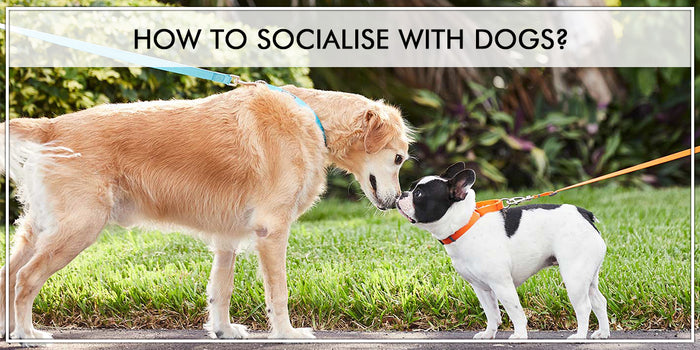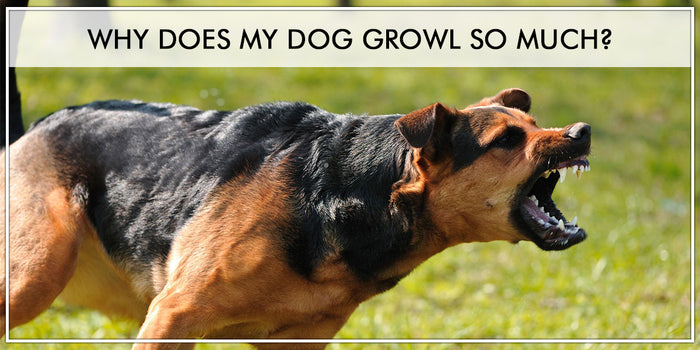10 Common Dog Behaviour Problems And Solutions
People often misunderstand or mishandle dog behaviour issues. Maybe you're new to dog ownership, thinking of getting a dog, or you're looking for some assistance with your dog. Understanding and preventing the most prevalent canine behaviour issues begins with a thorough understanding of them. Many of these issues can be avoided or controlled with a firm foundation of obedience training.
Following are certain bad habits that your dog may get involved in and how you can work towards solving them:
-
Digging: Dogs have a strong desire to dig. To persuade them to stop, you'll have to train them. Command them to "stop" or "no" if you catch them in the act. An interactive toy is the best way to divert their attention. Scolding them isn't going to help them in any way. Make sure you are consistent during the digging process, not afterwards. Giving these furry kids a sandbox to play with is the best that you can do. Let them dig up some of their favourite toys and watch them have a blast retrieving them. Praising them generously will teach them that they can dig in one spot all day.

-
Chewing: Dogs and puppies alike use their mouth to investigate everything. They enjoy chewing because it relaxes them. However, it ruins your belongings. Worse, they might consume a sock which may lead to their intestine becoming clogged. Break this bad behaviour right now. Provide chew toys and do not allow them to chew on things they shouldn't. Command them "stop", "no" or "leave" & replace the object with a chew toy of their liking, rewarding them once done.

- Begging: One solid technique to avoid this is to never feed your dog from the table. They won't learn to beg if they don't get scraps. You can either remove them from the room or put them in their kennel while you eat. Alternatively, instruct them to go to a specific location and wait it out.
- Not responding: Whether you called or not, always praise your dog when they come to you. Doing so teaches them that you are worth their attention. "Come" or "here" will suffice. If you only call their name, they might not comprehend what you want. Do not pursue them if they do not appear. While you're moving away, call them again. They may pursue you as a result of this. Tell them to sit and go get them if they still don't show up.
- Pulling on the leash: Assist your dog in learning to peacefully walk alongside you. Never let them pull if you don't want them to learn that they're going to get some joy or reward out of it. Maintain a short but loose leash. Stop then and there when you feel the leash getting tight. They'll come to a halt to see why you're not moving. Give them a reward when they return and then continue walking. They'll realise after a few days that pulling gets them nowhere.
-
Separation anxiety: If your dog becomes upset when you leave, assure them that you will return. Allow them to be alone for 5 to 10 minutes at first. Each time you go, stay a bit longer. Give them a chew toy or a treat-dispensing toy or put some light music on for them. When you leave and return, maintain a calm demeanour to let them know that being alone is fine. Some dogs respond well to crate training. It might not work, though, with a nervous senior dog. Seek advice from your veterinarian.

-
Whining: Is your dog constantly whining? You tell them that whining works if you pet them, look at them, or do anything other than ignore them. When they whine, ignore them or walk out of the room. When they stop, come back and play with them.

- Barking at the door: Teach your dog new behaviour to stop barking. Choose a location that is visible from the door. When you say, "Go to your spot," train them to lie down and stay there. This will keep them quiet and provide them with something to do while they wait to be welcomed. Ask a friend to come to the door with a treat in their hand but open the door only when the dog is calm. Eventually, they will learn to relax if they get that treat.
- Jumping: A dog's natural greeting behaviour is to jump up. However, this may deter visitors. If your dog jumps on you, back up. If your dog's front paws aren't on the ground, don't pay attention to them. You can then greet and pet them. Alternatively, tell them to sit and wait for them to do so before petting them. Keep your pleasantries to a minimum. This teaches your dog to manage its excitement. Make sure they don't bother or frighten anyone who isn't used to them.
-
Biting: If a dog feels frightened or nervous, it may bite. Early socialisation, on the other hand, teaches a dog to be at ease among people. Gradually expose them to various environments so that they feel secure. Spend as much time as possible with them so that they learn to trust others. Always be on the lookout for indicators that your dog is in pain and do everything you can to help them feel better. If children are involved, be particularly careful. If your dog continues to bite despite your attempts, get advice from your veterinarian or your pet's trainer.

Make sure you have your dog's favourite reward for positive reinforcement now that you know some effective dog training approaches. Shop our large assortment of dog treats, which include apple, peanut butter, chicken, bacon, and other varieties. You can also learn more about dog behaviours such as paw licking. If you need some help getting your dog housetrained, head to Pawsindia and get some delicious training treats or fun dog toys.
With PawsIndia – You Parent, We Pamper.
Let's revolutionise pet space together.
Tips to Socialise your Dog with Other Pets and Humans
The process of exposing your puppy to new sights, sounds, and experiences is known as socialisation. It's all about acclimating...
on
Why Does My Dog Growl So Much?
Growling is one of the many ways dogs communicate, and it's critical for humans who interact with dogs to know...
on


































